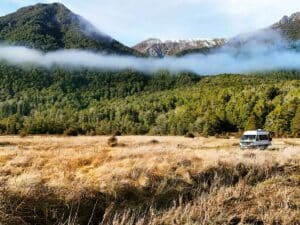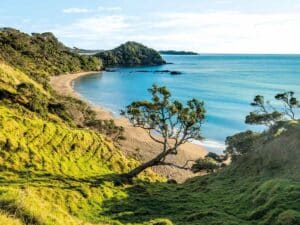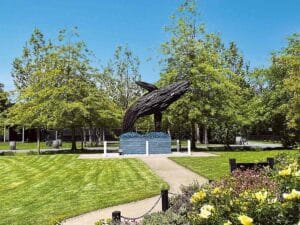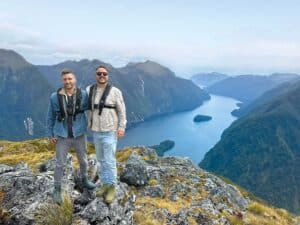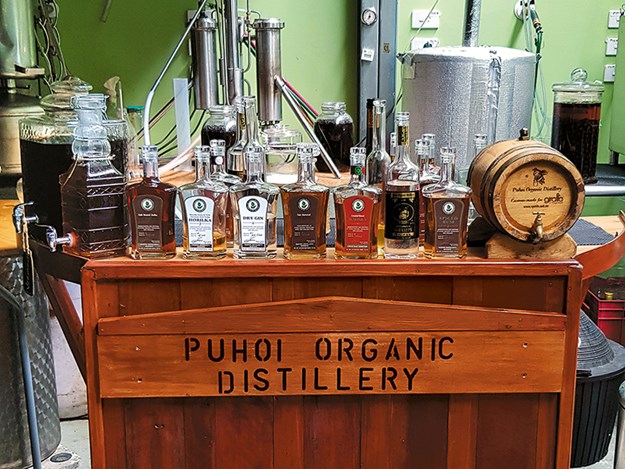 |
|
One of the world’s smallest commercial distilleries
|
On the side of the road just before entering the village of Puhoi, half an hour’s drive north of Auckland, stands a crucifix shrine symbolising the Catholic faith that enabled the earliest settlers from Bohemia to endure. In the 1860s they had come to a place much tougher than they’d ever imagined, where their very survival was threatened by the impenetrable terrain and terrifying isolation. The European-style village of Puhoi that they tenaciously carved from the bush is testimony to their doggedness and courageous spirits.
In the village, four years ago I found spirits of a different kind. Partly hidden away on a property on Saleyards Road is the Puhoi Organic Distillery where Alex Kirichuk, his wife Iryna and daughter Victoria have developed alcoholic beverages they call “spirits of the future”.
In the area last month, I visited again to see how things had progressed.
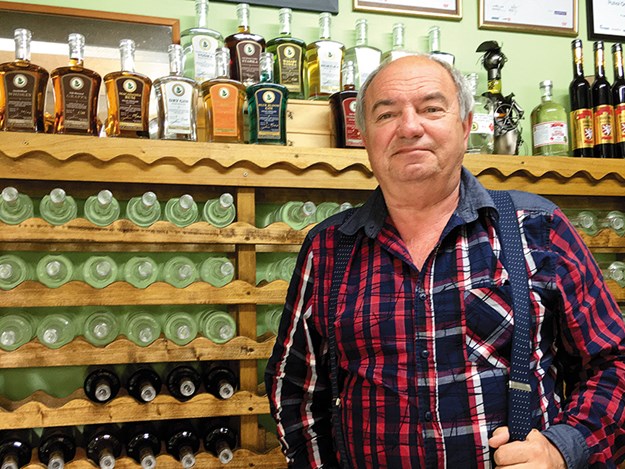 |
|
Alex’s liquors are by-products of medicinal formulas
|
“This is possibly the smallest distillery in the world,” said Alex as he ushered me past the diminutive area housing the distilling paraphernalia and up the stairs to an unpretentious space on the mezzanine floor. There isn’t much there: a plastic table cloth covers a large table; award-winning certificates line the walls and fascinating bottles filled with coloured liquids crowd surfaces and shelves.
As he reminded me how he and his family had arrived here, Alex handed me a glass of water from the distillery’s water source that comes from an aquifer 221 metres deep and 8000 years old.
Iryna and Alex came to New Zealand from Ukraine in 2002, drawn down-under by their interest in the America’s Cup. In Europe, Alex was a nuclear engineer and Iryna was a paediatric cardiologist with a respected reputation for concocting effective herbal supplements. The family decided to emigrate but there was no need for Alex’s expertise in New Zealand and Iryna did not want to restart her medical career. A business based on Iryna’s tonics was an alternative.
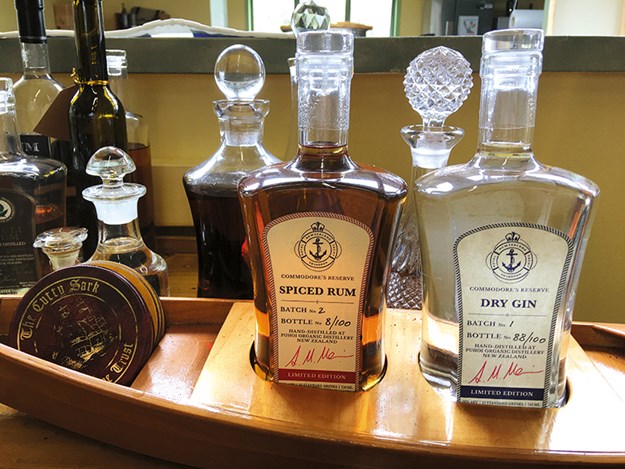 |
|
On the mezzanine floor bottles cover every shelf and cabinet surface
|
They set up in the village of Puhoi, which they thought was an obvious choice because the science of herbal medicine is well developed in Bohemia. Iryna’s tonics use adaptogens sourced from herbs, fruits and berries. Alcohol is the carrier and preservative for adaptogens and the meticulously crafted liquors that their company now makes are by-products of medicinal formulas.
There have been some exciting developments since I was last here. The Puhoi Organic Distillery has collected several local and international awards. It is now fully solar-powered, and for anyone who comes for a tasting and owns a Tesla car, there is a solar-powered recharging station to plug in to.
Last year Chinese scouts on the lookout for entrepreneurial products discovered the distillery and were clearly impressed. They invited Alex to exhibit some of his 80 varieties of liquor at the huge Chinese International Wine Expo in Guiyang. It was imminent but they were so keen to have his presence that they organised to get him there in seven days. It has now become an ongoing relationship.
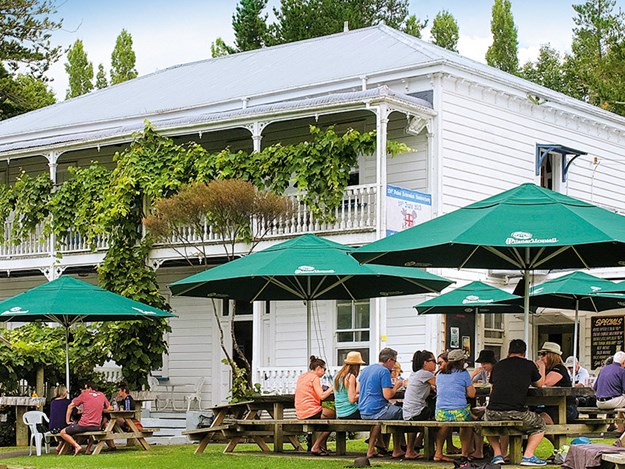 |
|
The picturesque Puhoi Pub sells Organic Distillery gin
|
Alex showed me a bottle of Oak Aged Grappa, several of which have sold in China for $50,000NZD each. I thought he was a little cavalier about the way he was holding it. “Don’t worry,” he said, “we can make another”.
We sat at the table. Sunlight filtered in the attic window. “We can make liquors with flavours as wide as the imagination,” said Alex. He offered me a taste of manuka honey and chilli vodka called Horilka. It was smooth and warming with an interesting flavour that lingered long after I had swallowed the last drop. I am an enthusiastic imbiber and I’d have liked a mugful but I kept myself in check.
I then tried (in no small quantity) vermouth, wasabi vodka and brandy made from Chinese green tea. If I’d drunk the same quantity of alcohol elsewhere I might have been well under the table but all I felt was a slight blurring of the mind. The astonishing thing about Alex’s concoctions is they don’t produce drunkenness or hangovers.
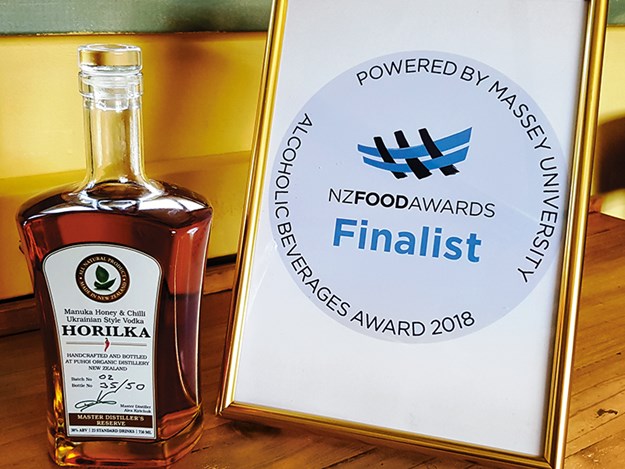 |
|
Horilka manuka honey and chilli flavoured vodka was a finalist in the Massey University NZ Food Awards
|
“Our alcohol is so pure it leaves the body quickly with few harmful effects and no organ damage,” he said. “You’d have to drink a large amount to get a hangover.”
Alex easily imparts entertaining information and I could see why some tastings last up to three hours.
“We are not a shop,” he says. “People come here by invitation or for pre-charged, pre-booked tastings.”
For the three-hour Luxury Tasting package, there is a presentation and plenty of food. In Ukraine, there is a saying: ‘you don’t drink without food and don’t eat without drinking’.”
We breathalyse our guests three times. After the first hour of unlimited drinking their alcohol level rises, after the second hour, it stabilises and after the third, it begins to decrease. About half an hour after people stop drinking, their blood-alcohol level will have dropped significantly. Nobody believes this to be true until they’ve tried.”
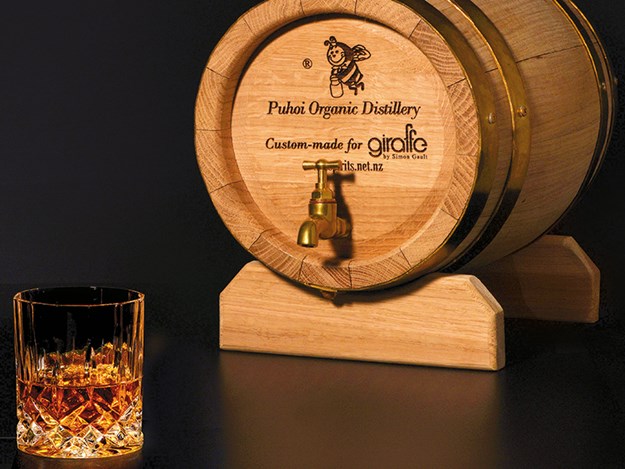 |
|
Alex says his alcohol is so pure that you’d have to drink a large amount to get a hangover
|
The family is never short of ideas. One of the latest products is Dr Kirichuk’s Herbal Bitter G&T. Add a few drops of this to tonic and ice and even the most discerning gin drinker wouldn’t guess it was alcohol-free.
And since I was last there, Victoria has developed three perfumes and an aftershave all based on food-grade alcohol and natural hypoallergenic ingredients. Alex likes three drops of the aftershave on his ice cream. “You should never put anything on your skin you can’t swallow,” he said. Victoria dabbed one of her new perfumes on my wrist. It was called Cinnamon Rum and had such a tantalising fragrance, it could well have been eaten. I sniffed hungrily at my arm all the way home.
The Puhoi Organic Distillery’s gin is available at the Puhoi Pub and online, and Iryna’s organic tonics at various pharmacies and online at spirits.net.nz
Find motorhomes, caravans and RVs for sale in NZ

